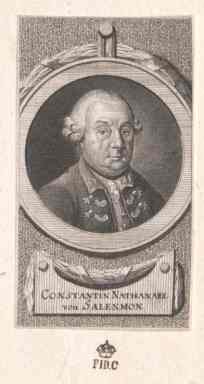Konstantin Nathanael of Salenmon
Konstantin Nathanael von Salenmon (born June 11, 1710 in Danzig , † December 15, 1797 in Halle (Saale) ) was a royal Prussian lieutenant general . He was chief of a free battalion and commander of the Wesel Citadel and the state government (state administration college) in Geldern . His Jewish origins represent a unique case among officer careers in the Prussian army before the 19th century. Salenmon addition belonged also to the few Prussian generals of that time, which not the nobility belonged, but was regularly since about 1760 of dubs and related the nobility , formally itself unopposed without ever ennobled to become.
Life
Born in Danzig, which was under Polish sovereignty, Salenmon (entered in the church register as Solomon) was of Jewish origin. He was first raised at home and was supposed to study. At the age of 17, however, he joined the Polish army and joined the Flemming regiment. He stayed there until 1745 when a duel with an officer forced him to leave the army on short notice. He entered French service in 1745 and fought with the French army from 1745 to 1748 in the Netherlands in the War of the Austrian Succession . He was used in sieges and conquests, including Tournai , Gent , Oudenarde and Bruges , as well as in the battle of Lauffeldt . After the Peace of Aachen , the Nassau-Saarbrücken regiment was also downsized and Salenmon, who had become captain, took his leave. He went to the Electorate of Saxony and got married there.
When the Seven Years' War broke out, the Prussian major Heinrich Detlef von Kalben set up a free battalion and persuaded his childhood friend Salenmon to take over a company in the battalion, which he did in October 1756. He distinguished himself and was promoted to major in December. From March 26th to August 25th, 1757 he defended the enclosed fortress of Geldern with a weak garrison against the French under General Graf von Beausobre and achieved a free withdrawal of the Prussian troops.
In the battle of Breslau he was wounded in the head and his superior killed. King Friedrich II appointed him lieutenant colonel out of turn and gave him the free battalion. The battalion then fought successfully in Saxony against the Luszinsky corps until the corps was reinforced by Austrian and Württemberg troops and the free battalion had to evade. He was besieged in Wittenberg and had to surrender the city on October 14th. For his resistance he was promoted to major general on March 5, 1760, without having been a colonel.
After the Treaty of Hubertusburg in 1763, the garrison regiment No. 9 from Magdeburg was merged with the battalion and placed in a garrison in Geldern. Salenmon became the commandant of the fortress of Geldern and head of the state administration committee. On July 1, 1774 he was appointed lieutenant general. He was one of only four (among a total of 94) generals of this rank in the infantry of Frederick the Great of non-noble origin (alongside Hans Kaspar Ernst von Schultze , Johann Jakob von Wunsch and Friedrich Wilhelm von Rohdich ).
In 1772 he was injured in the head in a duel with Colonel Ludwig Alexander von Quadt . Quadt then left the Prussian service and went to Russia, where he became Colonel of the Dragoons . In 1778, with the War of the Bavarian Succession , Salenmon received the order to form a free battalion again, but this remained in Wesel and was reduced again the following year. In 1787 he asked for his departure from the commandant's position in Wesel, which was also granted. He stayed in Geldern until the arrival of the French revolutionary army. Then he fled west and died in Halle in 1797.
family
He was married to a von Reibold from the Rensdorf family. She was the widow of the Guard Major von Reibnitz .
literature
- Anton Balthasar König : Biographical dictionary of all heroes and military figures . tape III . Arnold Wever, Berlin 1790, p. 478 ( Konstantin Nathanael von Salenmon in the Google book search).
- Bernhard von Poten : Salenmon, Constantin Nathanael von . In: Allgemeine Deutsche Biographie (ADB). Volume 30, Duncker & Humblot, Leipzig 1890, p. 215 f.
- Kurd Wolfgang von Schöning : The generals of the Chur-Brandenburg and royal Prussian army from 1640-1840. P. 98. Digitized
- Eduard Lange : The soldiers of Frederick the Great. P. 268. Digitized
Individual evidence
- ↑ Blog post on Salenmon by Kai Drewes at www.juedischer-adel.de/salenmon
- ↑ Joachim Engelmann, Friedrich the Great and his Generals , Wölfersheim-Berstadt: Podzun-Pallas, no year, p. 140
- ^ Johann Samuel Publication : Allgemeine Enzyklopaedie der Wissenschaften und Kuenste , Volume 8, p. 268, digitized
- ↑ Olaf Groehler , The Army . Berlin: Brandenburgisches Verlagshaus 2001, p. 56 f.
- ↑ Memorable and Useful Rheinischer antiquarius , Volume 9, Part 3, digitized version
- ^ Friedrich Nettesheim, History of the City and the Office of Geldern , Volume 1, p. 562, digitized
| personal data | |
|---|---|
| SURNAME | Salenmon, Konstantin Nathanael von |
| ALTERNATIVE NAMES | Salomon, Konstantin Nathanael von; Salémon, Konstantin Nathanael from |
| BRIEF DESCRIPTION | Prussian lieutenant general, chief of a free battalion, commander of the Wesel Citadel, chief of the Gelderian State Administration College |
| DATE OF BIRTH | June 11, 1710 |
| PLACE OF BIRTH | Danzig |
| DATE OF DEATH | December 15, 1797 |
| Place of death | Halle (Saale) |
